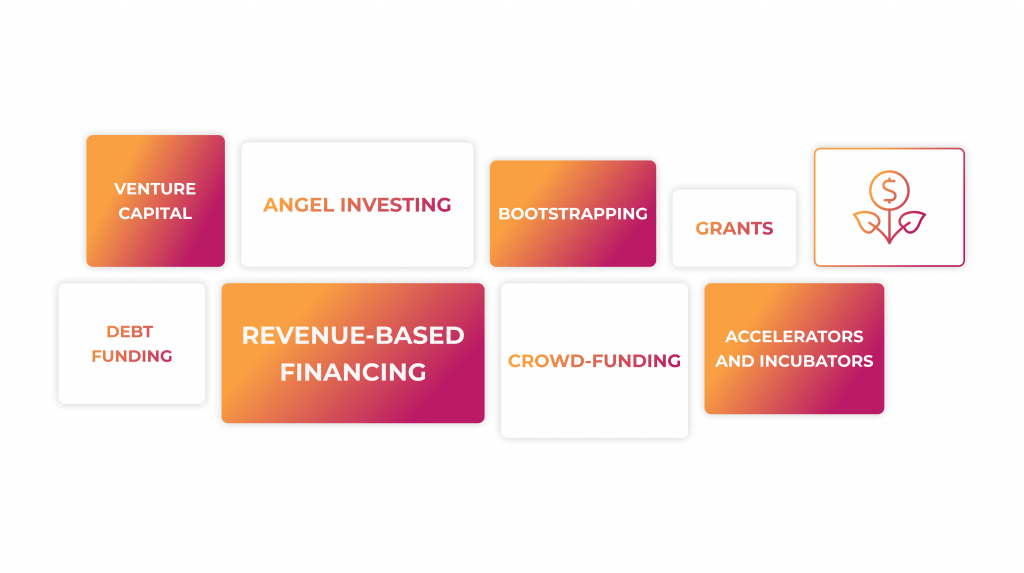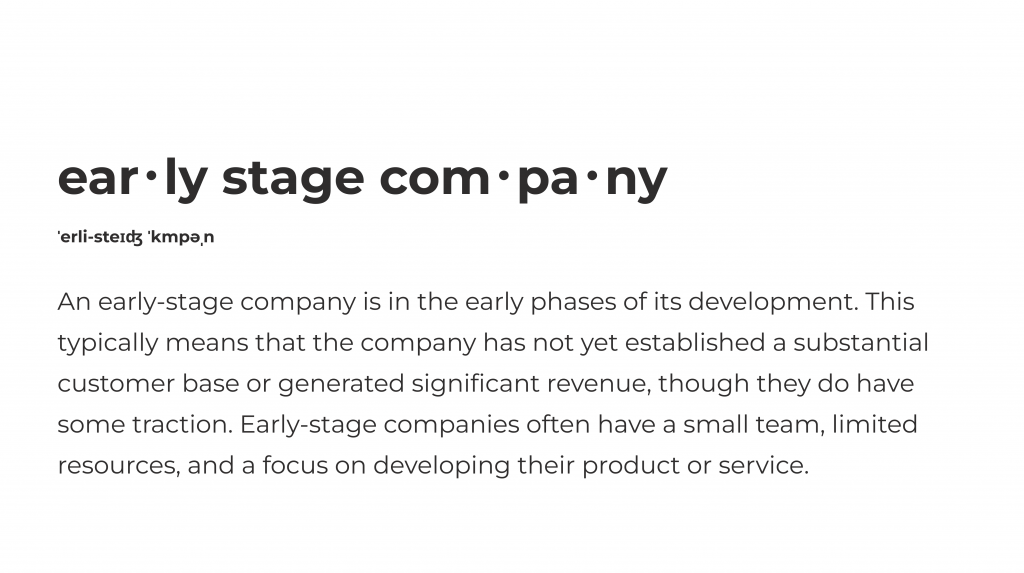
Wambui Karebe
- February 21, 2023
Exploring the different funding options for early-stage founders

Startups need funding to grow. Without it, as we saw in 2020 during the challenging Covid-19 pandemic, some are forced to put their day-to-day operations on hold or worse, shut down. An impending global recession is anticipated given the current economic climate. This is causing funders to be hesitant to invest, forcing founders to look for alternative funding options as reported by Bloomberg. What are the options, you ask?
A brief overview of the different funding options available
Most founders need different funding options throughout the growth stages their businesses. Ultimately, before seeking funding, a founder should have a robust financial plan in place and derive their capital needs accordingly. Let’s explore the funding options available to early-stage companies below.

Venture Capital & Equity Funding
Y combinator recommends raising money once founders have a compelling story to tell, a product, and some traction or customer adoption. This would mean that the company is in its early or growth stage. In this case, they would have access to venture capital, a form of private equity offered by funds or firms. Typically, these firms or funds invest for equity (shares), or a stake in ownership (with no shares) and tend to want to see a big return on their investment. Most venture capital firms tend to have a specific focus area or stage of growth, for example early-stage companies working on a climate tech solution.
Angel Investing
These vary from high-net-worth individuals who invest their personal money to small funders who are looking to grow their portfolios. Sometimes they are entrepreneurs themselves with a strong passion to help other founders and poses a great deal of knowledge. This form of capital raising is unique to each deal and may involve debt or equity. A lot of the time these are usually the first deals early or seed-stage businesses make. Some founders prefer this option due to the flexibility of negotiating terms. A lot of the time, Angels are proud to publicly share their investments which can be good for visibility.
Family Offices
These are private investment firms belonging to ultra-high-net-worth families. They are keen on maintaining their principal and are structured differently depending on their risk tolerance. A lot of them tend to be focused on impact and mission-driven investing as they plan to leave a legacy beyond financial gain. They have been known to take a long time when making investment decisions as funding is only a fraction of what they do.
Debt Funding
Here, a company borrows money from a lender and agrees to repay the loan with interest over a specified period. This differs from bank loans, as collateral is not a requirement. It is best suited for growth and mature businesses as they are in a better position to cover interest payments at the minimum. For early and seed–stage businesses, alternative debt suits them best which includes convertible debt that can in the future be converted to equity. There has recently been a surge in debt funding in sub-Saharan Africa as shown in a report by Partech Partners where in 2022, tech startups had a fairly stronger performance compared to other markets. Debt funding growth made up for 24% of total deals closed in Africa!
Bank Financing
This may be one of the most common types of debt funding which may be a loan, overdraft facility, LPO financing, or asset financing. Banks typically require the borrower to have collateral for example assets, cash flow, or letters of award for goods and services, and the facilities are repaid with interest. As a traditional form of lending, they also require a certain period of tax records for example over a year.
Revenue-Based Financing (RBF)
Also known as royalty–based financing, this is a type of capital raising where investors agree to provide capital to a company in exchange for a certain percentage of the company’s ongoing total gross revenues. Those revenue-shares are usually capped at a certain multiple. RBF is designed for companies that are seeking growth but do not have the revenues to attract traditional forms of funding like commercial loans or may lack assets or collateral to attract and secure the said traditional forms of funding. RBF does not necessarily target tech or high–growth companies, but rather those that have predictable income. As the repayment structure is based on actual revenues, it may not be suitable for companies in whichever stage that are not generating stable revenues as they would struggle to repay. As equity isn’t involved, there is no ownership dilution in this structure.
Redeemable Equity
This is a type of financing where the investee company agrees to redeem or buy back investors’ shares over time through dividends tied to revenue and according to Innovative Finance could also include free cash flow. This makes it suitable for established businesses in their early-stage and tends to be attractive for investors who are looking for a clear exit structure and founders who want to maintain their ownership structure. Moreover, companies can prevent unwanted dilution of their equity by using this structure as there is a clear exit plan for investors should the company not perform as expected.
Uncap’s Financing
Uncap offers alternative funding which combines redeemable equity with revenue-based financing. Our approach is a fully remote application with no need for pitch decks or collateral. We serve local founders in sub-Saharan Africa looking to raise early-stage funding of between 10,000- 50,000 EUR. We invest these funds to cover your early-stage funding need by purchasing shares in your company that you buy back based on the growth of your revenues.
Our eligibility criteria include; companies limited by shares based in Kenya, Uganda, Rwanda or Nigeria, well-kept records of business operations, and at least 12 months of revenue traction. Fit the criteria? Join the waitlist here.
Crowdfunding
Some founders opt to take this route to fundraise which involves a great deal of marketing and is usually done over the internet. Most times, the founder is looking for a small amount from a large group of people who believe in the company’s vision. The most common type of crowdfunding is donation based where the founder is under no obligation to give up equity or repay the funds raised. It is however crucial to understand how the platforms work before signing up. In 2016, Enda, a Kenyan running shoe production company, raised $140,000 from a donation-based Kickstarter campaign to build its first prototype.
Mastercard’s 2022 FinTech Whitepaper showed that equity crowdfunding is a rapidly growing sector in Africa though more needs to be done to enable the industry. The equity crowdfunding model, a variation of the donation-based model, allows individuals to invest money in exchange for an equity stake. Equity crowdfunding remains unregulated in Uganda and Tanzania and is currently not allowed in Nigeria.
Aside from tapping into a large pool of investors, crowdfunding also helps companies build a community of supporters.
Accelerators & Incubators
These are a good option for seed and early-stage companies and tend to be highly competitive as they offer more support and services than only financing and can include mentorship, marketing, and operational strategy to name a few. Some of these accelerators and incubators may also have a thematic base such as supporting tech-based startups or climate-smart enterprises and are a great way for entrepreneurs to keep up with peers and emerging trends in their industry. They usually have a period of engagement and once complete, they then provide funding or access to investors. Due to the value given, most charge a fee which is usually quite expensive in terms of their deal structure. Entrepreneurs should therefore strategically assess the fit of an accelerator program to their business goals.
Bootstrapping
This refers to the method of using existing resources rather than external capital to start a business. This includes personal savings and equipment or monies from friends and family. A lot of companies start off in this way and this article on Nigerian women sharing their bootstrapping experience can serve as great inspiration.
Grants
This is an amount of money typically awarded by an institution, foundation, or government with the aim of funding an idea or project that need not be repaid. They are industry specific and highly competitive. In some cases, winners may receive media coverage as an additional bonus. Grant-making activities have also varied in the recent past with donors shifting from one-off cash awards for entrepreneurs to:
- Service-based awards where the grantor pays for the grantee to receive certain services such as training, mentorship, and/or equipment.
- Multi-year funding where the businesses access funding in tranches based on KPIs set at the beginning of the grant agreement.
- Co-funding facilities where they match the entrepreneur’s equity or debt contribution to the business.
- A combination of grants and technical assistance to support initial business growth.
Final Thoughts
In conclusion, the type of funding a founder is eligible for depends on what stage their business is in. We recommend founders research and conduct thorough due diligence before reaching out and applying for funding to ensure that it is the right fit. Once you receive an offer, consider consulting a lawyer to review the terms and ensure you fully understand them before signing. It is also important to keep the building of your company or product top of mind as you fundraise as this process can take quite some time and investors are always looking for signs of growth.
Finally, remember that it is normal to get overwhelmed by emotions while fundraising, after all, founders are human! However, try not to get too discouraged should you receive negative feedback as this may be due to a myriad of reasons. Instead, thank them for their time and politely ask for feedback. You never know how this information may help improve your future fundraising experience.
Stay posted on our investment cohorts!
Want to get funding for your business and join a growing community of other great founders? Join the waitlist to be the first to know once the application phase is open.


